All seniors should be aware of these hearing health hazards!
As we gracefully age, it’s natural to focus on maintaining our overall health. But what about our hearing? With our hectic lifestyles, we often overlook the silent dangers that can gradually chip away at our hearing.
That’s why Indulging Health has decided that it’s time to tune in and pay attention to the unexpected hearing health hazards that seniors must know about.
From the constant noise of city streets to the seemingly harmless activities we accomplish daily, surprising threats are lurking around every corner, jeopardizing our ability to hear clearly.
These hazards aren’t always obvious, but their impact can be profound, affecting our ability to engage with the world around us and our overall quality of life.
Join us as we look into the depths of these often-overlooked dangers, shedding light on the importance of proactive hearing health care.
Let’s navigate the 7 hearing health hazards together, empowering seniors everywhere to take charge of their auditory well-being and enjoy the sounds of life for many more years to come.

But first…There are 3 different kinds of hearing loss!
Before we talk about the surprising hearing health hazards, let’s establish the types. There are three categories.
1. Mixed: This describes an instance in which sensorineural and conductive hearing loss happen at the same time.
2. Conductive: Sounds can’t get past the outer or middle ear when conductive hearing loss occurs. This makes things sound muffled and is often caused by an illness that leads to an ear infection, fluid in the middle ear, or a hole in one’s eardrum. Medication or surgery can usually fix the issue.
3. Sensorineural: This is when there’s damage to the inner ear, which comprises the cochlea and semicircular canals. It’s the most common type of hearing loss, often caused by head trauma, aging, or illness. The good news is that sensorineural hearing loss can be treated with hearing aids. You can choose from in-ear, over-the-ear, or in-canal devices.
…Now, let’s talk about the things that can affect your hearing without you even knowing!
Hearing health hazard: Prescription medications
You likely wouldn’t expect a prescription you get from the doctor to damage your hearing, but it can happen. To be clear, it isn’t all medications. According to the American Speech-Language-Hearing Association, about 200 medications and chemicals can damage hearing.
A side effect of some medicines is ototoxicity, which harms your inner ear. This can result in ear ringing, hearing loss, or having issues with balance. The first sign is generally the ringing or your ears feeling “full.”
Before you begin taking a medication that can be ototoxic, you should have your hearing established to have a baseline for comparison.
Hearing health hazard: Dental problems
You probably wouldn’t connect dental issues to issues with your hearing. Nevertheless, the two are more related than you might think.
Bacterial infections in the mouth, including impacted wisdom teeth or tooth infections, can compromise your hearing because they cause inflammation that constricts your blood vessels. Narrowed blood vessels limit blood flow to vital ear hair cells and critical brain regions.
Cochlear hair cells are found in the inner ear and work as the sensory cells for hearing. They shift the vibration from sound into electrical signals for your brain. They can become injured if they don’t get enough blood, leading to permanent hearing loss.
Now, let’s be clear: That doesn’t mean getting a tooth infection will hurt your hearing. But, it does highlight the importance of dental hygiene and addressing issues swiftly to avoid unforeseen side effects.

Hearing health hazard: Sleep apnea
Recent studies have linked sleep apnea to increased cases of hearing loss. Research published in the Journal of Clinical Otolaryngology discovered that sleep apnea raises the chances of hearing loss by 21%.
Even though there isn’t a conclusive reason from the medical community yet, it’s most likely related to the reduced blood flow to the inner ears. Without blood flow, the vessels and cells die, which means messages won’t get from your ear to the brain.
Having sleep apnea doesn’t always mean you’ll have hearing loss. But it’s just another reason to be sure you’re pursuing treatment. You should also keep updated examinations to be sure you’re tracking your hearing over time.
Hearing health hazard: Infections
Both bacterial and viral infections can have an impact on your hearing. Something as simple as an ear infection or a cold can muffle your hearing, damage your balance, or result in tinnitus. The good news is that this sort of hearing loss is usually only temporary.
The sooner you pursue treatment, the less likely it is that the hearing loss will be permanent. It all depends on the source of the infection. Typically, virus-induced hearing loss is sensorineural, although conductive and mixed hearing loss is possible.
Bacterial infections of the middle ear generally cause conductive hearing loss. Our body’s inflammatory response can result in mucus or fluid buildup behind the eardrum and soften the hearing. Most cases can be resolved with medication.
Hearing health hazard: Diabetes
The American Diabetes Association says that if you have diabetes, you’re twice as likely to develop hearing loss. The reason for that is because the disease can wreak havoc on the nerve cells in your ears. It all comes back to sugar levels.
High blood sugar levels degenerate the nerves and cells of the inner ear. Low blood sugar can be just as bad over time because it can compromise signals from the ears to your brain.
Basically, if your blood flow isn’t giving the nerves what they need to send the signals, hearing loss ensues. Although having diabetes raises your risk for hearing loss, it doesn’t automatically mean you’ll develop it, though.
According to the National Institute of Diabetes and Kidney Diseases, you should follow these steps to maintain your blood sugar levels and defend yourself against any possible hearing health hazards:
-Quit smoking
-Monitor your glucose levels regularly
-Exercise
-Develop a diabetes-friendly meal plan
-Drink lots of water and avoid juices high in sugar
Hearing health hazard: Head trauma
When we say head trauma, we’re referring to anything that damages the structures of the brain or ears. Examples can include a foreign object in your ear, hitting your head, or an accident that damages your ear canal or eardrum.
When something ruptures your eardrum, auditory signals that are generally transmitted through vibrations are restrained from the ear to the brain. If you have a ruptured eardrum, hearing loss is only temporary.
It doesn’t always have to be a substantial circumstance to damage your inner ear or eardrum. Even things that don’t seem like a big deal can affect your hearing. If you’ve noticed hearing loss and recall any head trauma, be sure to tell your doctor about it immediately.

Hearing health hazard: High blood pressure
We’ve established that blood flow is crucial for healthy hearing. The ear structures are very fragile and susceptible to changes in blood flow. When your blood pressure is high, your blood vessels and heart are overworked.
Your heart begins to pump more blood than usual, meaning the ear structures are overwhelmed with blood, resulting in temporary hearing loss that won’t go away until this hearing health hazard goes back down.
But, if you always have high blood pressure, it can harm the blood vessels in the ear, which is permanent. Hearing loss isn’t one of the common side effects of high blood pressure, but it can occur.
To be on the safe side, make sure you’re regularly monitoring your blood pressure. Here’s something that can help!
We hope you found this article on hearing health hazards informative. Be sure to share your thoughts with us in the comments section.
But don’t leave yet! Indulging Health has much more to offer. For example, find out the 9 Simple Reasons Your Short-Term Memory Is Getting Worse According to Doctors













